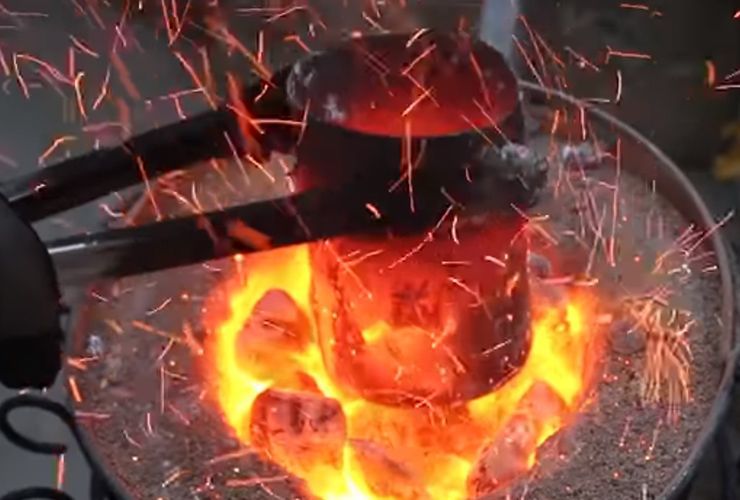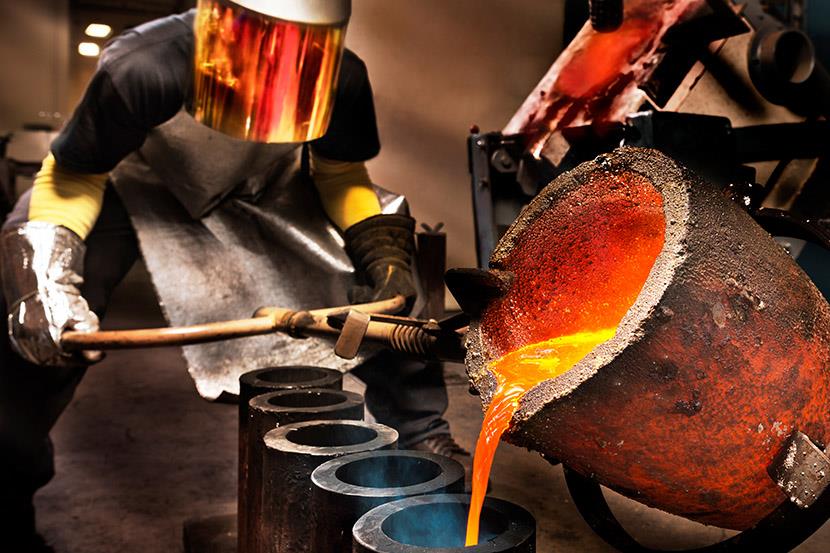Exploring the Function of a Metal Foundry in Modern Manufacturing Processes
Metal foundries are critical in the landscape of contemporary manufacturing. They provide critical parts throughout various fields, adjusting to the demands of sectors like automotive and aerospace. Advanced strategies such as 3D printing and automated casting have changed their operations. Additionally, sustainability has actually become a top priority, influencing their practices. As these foundries progress, the effects for producing efficiency and technology are considerable, elevating concerns concerning their future trajectory in an ever-changing economic situation.
The Evolution of Metal Casting Strategies

With the rise of automation, foundries adopted methods like die casting and lost foam casting, improving the manufacturing process and decreasing waste. Each evolution in metal casting techniques has dealt with the needs of various industries, from automotive to aerospace. As metal casting proceeds to breakthrough, the interaction in between method and modern technology stays critical in meeting contemporary manufacturing obstacles, guaranteeing that foundries adapt and flourish in an ever-changing landscape.
Integration of Advanced Technologies in Foundries
Although traditional metal casting techniques have offered the industry well for centuries, the integration of innovative innovations in foundries is reinventing the manufacturing landscape. Automation and robotics improve manufacturing procedures, enhancing performance and decreasing the risk of human mistake. Once difficult with traditional techniques, technologies such as 3D printing permit for fast prototyping and the production of complicated geometries that were. Additionally, information analytics and the Internet of Things (IoT) enable real-time surveillance and predictive maintenance, inevitably resulting in lowered downtime and enhanced performance. These improvements likewise promote customization, permitting producers to react swiftly to market demands. As sustainability comes to be a top priority, the adoption of eco-friendly innovations, such as electric melting furnaces and advanced sand improvement systems, even more demonstrates the market's dedication to development. Jointly, these technologies not just improve operational efficiency however likewise position foundries at the leading edge of modern-day production practices.
The Influence of Product Science on Foundry Workflow
Material scientific research plays a crucial function in improving factory operations, influencing both the choice of products and the overall casting procedure. Developments in product science offer a deeper understanding of the properties of alloys and metals, enabling foundries to select the most appropriate products for particular applications. This understanding improves the performance and resilience of cast products, which is necessary for satisfying market standards.
Developments in product formulas and additives add to boosted casting strategies, enhancing and reducing problems production efficiency. The development of innovative metal composites and clever materials allows foundries to create lighter, stronger elements, which are significantly searched for in various sectors such as automobile and aerospace.
In addition, product science aids in the recycling of metals, making processes more cost-efficient and effective. By leveraging the most up to date findings in material scientific research, foundries can adjust to progressing market needs, ensuring their competitiveness in a quickly changing manufacturing landscape.
Sustainability Practices in Modern Metal Foundries
With the expanding emphasis on ecological duty, modern-day metal foundries are progressively executing sustainability practices to minimize their eco-friendly footprint (Aluminum Foundry). One essential method entails the recycling of scrap metal, which not just lowers waste yet also saves energy and basic materials. Foundries are taking on sophisticated melting technologies that boost power performance, as a result decreasing greenhouse gas discharges. Additionally, using eco pleasant finishes and materials has actually gained traction, more decreasing damaging exhausts throughout manufacturing
Water preservation techniques, such as closed-loop air conditioning systems, are being carried out to decrease freshwater usage. Several foundries are also spending in renewable resource resources, like solar and wind, to power their procedures, consequently decreasing dependence on fossil fuels. Furthermore, staff training programs concentrated on sustainability practices promote a culture of environmental understanding within the labor force. These campaigns collectively add to an extra sustainable future for metal foundries while meeting the demands of eco-conscious customers.
The Future of Foundries in a Changing Economic Landscape
As the global economic climate develops, foundries face a myriad of challenges and chances that will shape their future (Aluminum Casting). The increasing need for lightweight materials and advanced alloys necessitates advancement in manufacturing methods and technical integration. Automation and smart manufacturing methods are becoming essential for enhancing efficiency and decreasing functional costs. Furthermore, the rise of sustainability her response worries obliges foundries to embrace greener procedures and recycling campaigns, lining up with worldwide ecological objectives
The financial landscape is also shifting, with supply chain disturbances and varying raw material costs providing considerable difficulties. Foundries need to adjust by expanding their supply sources and purchasing products science. Collaboration with markets such as sustainable power and electrical vehicles can promote development. Eventually, the future of foundries will rely on their ability to take advantage of technical advancements while remaining responsive to market characteristics and ecological imperatives, ensuring their relevance in contemporary production.
Regularly Asked Questions
What Kinds of Metals Are Generally Used in Foundries Today?
Typically made use of metals in foundries today consist of light weight aluminum, iron, copper, zinc, and steel. important site These materials are preferred for their diverse buildings, enabling a vast array of applications in markets such as vehicle, aerospace, and construction.
Exactly how Does a Factory Make Sure Quality Assurance in Its Products?

What Security Actions Are Applied in a Metal Foundry?
Metal foundries carry out safety and security procedures including personal protective equipment, ventilation systems to minimize breathing of fumes, normal security training for employees, emergency action methods, and strenuous equipment maintenance to decrease risks and guarantee a safe workplace.
How much time Does the Metal Casting Refine Usually Take?
The metal casting procedure generally takes several hours to days, relying on aspects such as the complexity of the mold, the sort of metal made use of, and cooling times. Each project's requirements substantially influence the period.
What Industries Mainly Rely on Metal Foundries for Manufacturing?
Automotive, machinery, building, and aerospace markets largely depend on metal foundries for manufacturing. These markets make use of cast metals for components, making sure durability and performance essential for their respective applications in manufacturing and setting up processes.
Metal foundries are critical in the landscape of contemporary production. Aluminum Casting. Traditional metal casting approaches have served the market well for centuries, the integration of advanced technologies in foundries is revolutionizing the production landscape. Advances in material science provide a much deeper understanding of the residential properties of alloys and metals, making it possible for foundries to choose the most appropriate advice materials for certain applications. With the expanding focus on environmental obligation, contemporary metal foundries are significantly implementing sustainability practices to lessen their eco-friendly impact. Automotive, building and construction, machinery, and aerospace sectors mainly count on metal foundries for production